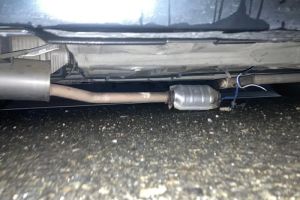How to Get Timely Help During Roadside Assistance in the U.S.
We’ve all been there—driving down a quiet highway or through a bustling city when, out of nowhere, our vehicle breaks down. It’s one of those stressful moments where you’re left wondering, “What now?” Luckily, roadside assistance services are available to help us in these tough situations. I’ve had my fair share of breakdowns and emergencies on the road, and in this article, I’ll share my experience and the essential steps to ensure you get timely help during roadside assistance in the U.S. Whether you’re stuck on the side of the road or in the middle of nowhere, knowing how to access help quickly can make all the difference.

Pick Your Part - Help Yourself
1232 Blinn Ave, Wilmington, CA 90744, USA
Understanding Roadside Assistance Services
Roadside assistance services are designed to provide help when your vehicle encounters unexpected problems while you’re on the road. These services are typically offered by insurance companies, auto clubs, and independent towing companies. In my experience, having a reliable roadside assistance plan is invaluable, as it can save you from long hours of waiting and additional stress. Roadside assistance can cover a variety of services, including flat tire changes, battery jump-starts, lockout assistance, fuel delivery, and towing when necessary.
For those of us who rely heavily on our vehicles, it’s essential to have a plan in place for emergencies. I learned the hard way that not all roadside assistance services are created equal. Some are quick and efficient, while others may leave you waiting for hours. That’s why understanding the scope of your service plan and knowing how to get timely help can make your experience much smoother.

California Roadside Service
1426 S Allec St, Anaheim, CA 92805, USA
1. Prepare Your Vehicle for Emergencies
Before you even think about what to do when you’re in a roadside emergency, it’s important to take proactive steps. Over the years, I’ve learned that regular vehicle maintenance can significantly reduce the chances of a breakdown. Basic checks such as monitoring tire pressure, checking your car’s fluid levels, and maintaining your battery can prevent many roadside issues. I always make sure to take my car in for a tune-up before long road trips to ensure that everything is running smoothly.
Beyond maintenance, it’s also essential to be prepared with an emergency kit. I keep a small bag in my trunk with essential items like jumper cables, a flashlight, tire repair tools, a first-aid kit, and non-perishable snacks. Having these basic items at your disposal can often get you back on the road before you even have to call for help.
2. Choose the Right Roadside Assistance Service
One of the most critical decisions I’ve made over the years is choosing the right roadside assistance service. There are many providers out there, and each offers different levels of service. Some come with the peace of mind of knowing that help is only a call away, while others might not be as reliable. I’ve had both positive and negative experiences with different providers, and I’ve learned the importance of reading reviews and understanding what’s included in my plan.
Many insurance companies offer roadside assistance as an add-on to your car insurance policy. This is often one of the most cost-effective options, especially if you already have insurance with the provider. However, there are also independent roadside assistance companies that offer specialized services like 24/7 towing, tire repairs, and battery replacements. When selecting a service, it’s important to consider the following:
- Coverage area: Make sure the service covers the regions you frequently travel in, whether that’s local, state, or national.
- Response time: Timely assistance is crucial, so find a service that guarantees fast response times.
- Customer service: Look for a provider with excellent customer reviews and responsive support.
- Additional services: Some services include perks like free towing for a specific distance, trip interruption coverage, or even vehicle rental assistance in case of major breakdowns.
Having the right provider means you can focus on getting the help you need without worrying about extra costs or delays. It’s worth doing the research upfront to ensure you're covered for the long term.
3. How to Request Help Efficiently
When I’ve found myself stranded, the next step after assessing the situation is calling for help. However, getting timely help requires providing the right information to the service provider. I’ve learned that giving clear and accurate details can significantly speed up the process. Here’s what I’ve found helpful when requesting roadside assistance:
- Your exact location: The more precise your location, the quicker the assistance will arrive. If you're not sure where you are, using your phone’s GPS or a map app can pinpoint your location. I often use Google Maps or Waze to share my coordinates directly with the service provider.
- Description of the issue: Be as specific as possible about the problem you’re facing. Whether it’s a flat tire, engine failure, or dead battery, providing the details helps the service provider prepare the right tools and equipment before they arrive.
- Safety first: Make sure you're in a safe spot away from traffic before calling for help. Turn on your hazard lights, and if possible, set up road flares or warning triangles to alert other drivers to your presence.
By giving detailed and accurate information, I’ve noticed that roadside assistance services can arrive faster and more prepared, making the process less stressful.
4. What to Do While Waiting for Assistance
Waiting for roadside help can be one of the most frustrating parts of a breakdown. However, I’ve learned that staying calm and proactive can make a big difference. While waiting for help, I do the following:
- Stay inside the vehicle: If you're on the highway or in a busy area, staying inside your car is generally the safest option. Keep your seatbelt on, especially if you're parked close to traffic.
- Stay visible: Make sure your hazard lights are on. If you have them, setting up road flares or reflective triangles can help other drivers see you from a distance.
- Keep essentials handy: Having water, snacks, and a portable charger can help make the wait more comfortable.
It’s also helpful to stay in contact with the roadside service provider, as they may give you updates on their arrival time or let you know if there are any delays.
5. Know When to Request Towing
In some cases, a breakdown may be beyond a quick repair, and towing is necessary. I’ve found that knowing when to request towing can save time and effort. If the issue involves major mechanical failure or safety concerns, such as a broken axle or engine problem, towing may be the safest and most efficient option.
When requesting towing, make sure to ask about the provider's towing limits and the distance they’ll cover for free. Some services include a set number of miles for towing, while others may charge extra for longer distances. If you’re in an unfamiliar area, it’s also helpful to know the location of nearby repair shops or auto mechanics that the towing service can take your vehicle to.
6. Finding a Reliable Roadside Assistance Provider
If you’re looking for dependable and quick roadside help, I recommend checking out providers like Rescue & Towing, which offer comprehensive services and quick response times. Whether you’re dealing with a flat tire, running out of gas, or need a tow to the nearest repair shop, knowing where to turn for help can take a huge weight off your shoulders.
Having a reliable roadside assistance service on hand is more than just a convenience; it’s a crucial safety net that ensures you can get back on the road without unnecessary stress. With the right planning, a solid service provider, and some basic preparation, you can handle any roadside emergency with ease.




























